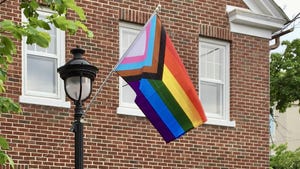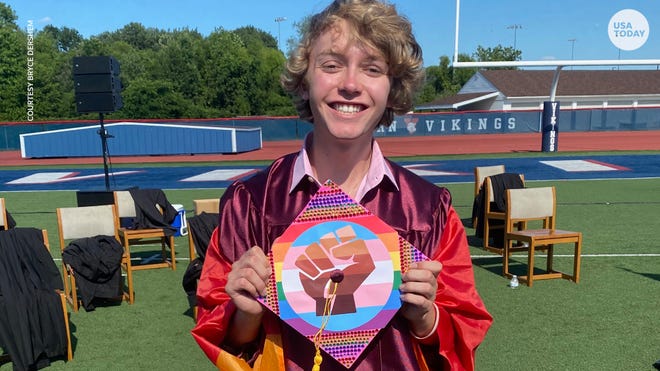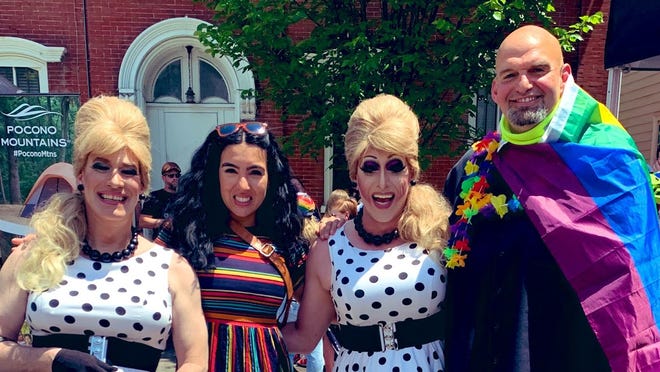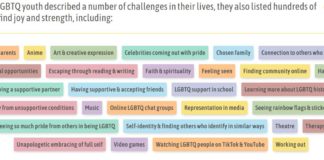The LGBTQ+ community in the Poconos has faced a particularly difficult time of COVID-19, but with the help of individuals and organizations from across the region, they have persevered throughout the pandemic.
With a lack of viable information regarding LGBTQ+ individuals throughout the past 15 months, paired with funding issues that hit the community hard, making the way through the pandemic has been a particularly challenging feat for allies and advocates in the Poconos.
Despite those strains, continuing and increasing efforts on the local and state level are aiming to address those shortfalls in order to ensure that the lesbian, gay, bisexual, transgender and queer community receives the care that they, and everyone else, deserve.
A lack of data
On June 10, the Pennsylvania Commission on LGBTQ Affairs hosted “Vax Facts: Afternoon Tea on LGBTQ Health,” the fourth in a series of Facebook Live panel discussions focused on providing “relevant and accurate information” on COVID-19 vaccines and addressing questions from concerned citizens.
Access to health care was a prime focus of the panel, as Acting Physician General, Dr. Eloho Ufomata noted, pointing out that vulnerable populations have been “disproportionately affected” by COVID-19, especially among communities of color and under-resourced communities.
“Unfortunately, we do not have robust data collection for LGBTQ folk,” Ufomata said. “We do know that historically, this population has faced vulnerability with access to healthcare. That’s why I think efforts like this are so important, so that folks can have high quality information, specific to the needs of LGBTQ people, so that each person can make the best decisions regarding vaccination.”
Since the start of COVID-19 vaccinations, experts have speculated that LGBTQ+ individuals would, like many other vulnerable and minority groups, exhibit some hesitancy, or at the very least, barriers to access a vaccine.
Compounded with a lack of readily available data concerning the community and their views on vaccination, concerns about the Keystone State’s LGBTQ+ community being underserved during vaccination drives were, and remain, warranted.
Not that LGBTQ+ individuals are apprehensive when it comes to their desire to get their shots; in fact, information that is available about the community shows quite the opposite.
From March 4 to April 5, Bradbury-Sullivan LGBT Community Center — an organization based in Allentown that offers a number of educational, health, support, artistic programs and more — partnered with the Graduate School of Social Work and Social Research at Bryn Mawr College to conduct a survey about vaccine hesitancy and barriers.
The results showed that 54% of the 1,545 respondents had received a dose of the COVID-19 vaccine, and among those who had not received a vaccine, 85% were interested in getting vaccinated as soon as it was available.
One particular issue when it comes to vaccination among the LGBTQ+ community is rooted in an apprehension to reveal their sexuality to health care providers, meaning that data collection and targeted treatment could still be problematic.
The 2020 Pennsylvania LGBTQ Health Needs Assessment noted that nearly a quarter of respondents “had experienced a negative reaction from a health care provider when they learned they are LGBTQ,” and that “one in three respondents fear seeking health care services because of potential negative reactions from health care providers.”
While the Bradbury-Sullivan LGBT Community Center survey provided a least some information on the community, experts agree that further studies are a necessity in order to ensure that such a vulnerable community can receive the best possible care in extreme times of need.
“As members of a community that’s experienced the worst of the HIV epidemic in the late 80’s, LGBTQ+ people have taken the COVID-19 pandemic seriously,” Pennsylvania Commission on LGBTQ Affairs Executive Director Dr. Alvarez Febo, who moderated the panel discussion, said. “Ensuring that our community is well informed about the COVID-19 vaccines allows people to make the best decisions for their health.”
Service interruption
In the Poconos, and across the rest of the commonwealth, medical and mental health support for underserved communities like the LGBTQ+ community were adversely affected throughout the pandemic, Novus Adult Care Services’ marketing and public relations director Benny Vukaj pointed out. Novus ACS has offices in the Poconos, Lehigh Valley and Bucks County areas.
“I think what happened was the resources that were already limited for the LGBT community were definitely heavily impacted when the pandemic hit. So I think it was programs that didn’t have a lot of support or that needed more support, they were the first ones to get the rug pulled out from under them, which eliminated or suspended those programs,” Vukaj said, adding that “priority-based” programs, such as care for HIV-positive patients, took precedence over a wealth of other initiatives.
When the Department of Health had to trim their own LGBTQ+ oriented programs down, NovusACS stepped up to assist those in need of HIV treatment and prevention. Vukaj said that when one organization located in the Greater Philadelphia area had to shut down their care programs, resulting in months-long wait lists, patients flocked to NovusACS for help, as they remained open throughout the pandemic.
While there were, and continue to be, issues with addressing the pandemic in all communities, including the LGBTQ+ sector of the commonwealth, Vukaj said that he does not believe that funding cutoffs or program closures were executed with malicious intent.
“I think that the agencies and the government did the best they could, but I don’t think anyone could have anticipated the outcome or how this pandemic would have unfolded,” Vukaj said.
The Bradbury-Sullivan LGBT Community Center themselves were forced to close off their in-person programs and services through July 2021, though they were able to offer most of those programs in a virtual format.
Nevertheless, the impact on programs and services threw targeted care organizations such as NovusACS for a troublesome curve, one which required quick thinking.
Story continues after gallery.
Adapting to a changing world
Vukaj said that adapting patient services at NovusACS care locations quickly was an absolute necessity. Outside of some logistical changes with insurance and transitioning to a predominantly virtual or telemedicine-based appointment system, the organization was able to adjust quickly, as they have always been primed to do.
“We are very adaptive because of the category that we’re in and what we do, because we have state funding and that changes constantly,” Vukaj said. “We always have to be rolling with the ball and rolling with the punches. When this pandemic hit, we’re like, ‘Okay, we have to figure out how we’re going to navigate through this and where we’re going to get hit.’ And so we hope for the best, but we plan for the worst.”
Vukaj said that addressing increased requests for mental health care was another key issue that NovusACS saw throughout the pandemic. As many individuals with mental health issues experienced throughout the pandemic, isolation and limited contact proved to be difficult to deal with. Among the LGBTQ+ community, this was decidedly difficult to deal with, as Vukaj noted that mental health care is at the forefront when taking care of those patients.
“There was definitely a influx of mental health concerns and issues that we had to address or give more to patients because of these circumstances,” Vukaj said.
When government supported initiatives and funding were stretched thin throughout the pandemic, LGBTQ resource centers — which, in the case of locations like NovusACS — that provided physical and mental health care services to the community took on the duty of educating patients, if they were able to remain operational. In some cases, this actually proved beneficial, as staff at NovusACS were able to connect with patients and provide reliable information on COVID-19, and in some instances, vaccines.

“We have people from all walks of life come and use our services, and we take the opportunity to educate people, and give them some awareness of what’s going on and what their options are,” Vukaj said. “And that’s all we can do is give a warm handoff of information, and resources to people. It’s up to them to implement that. And we give them options. We’ve also administered shots, within our organization, when we were able to access the vaccines.”
According to Vukaj, NovusACS reached out to patients to inform them when they had vaccines available, and offered to administer them. When they were without supplies, they went out of their way to connect patients to providers who could offer vaccinations.
Looking forward, Vukaj recommends that anyone in the LGBTQ+ community who wishes to get more information about vaccines, or just a helping hand that can direct them to sources of reliable information, should reach out to trusted advocates, and most of all, focus on their own self care, as “we should take it upon ourselves to find and figure out the best avenues for the best outcomes of ourselves.”
“Sometimes it’s harder said than done. And that’s why if you have a circle friends, a network to reach out to— and you’d be surprised how many people will be willing to help— all you need is to link up with one good organization or resource and they will gladly help you find other resources and organizations for what you need,” Vukaj said.









